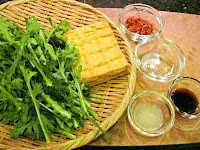<Ingredients>
1 atsuage deep-fried tofu
1 tbsp dried benibana safflower petals
For yuzu-lemon dressing
1 tbsp dashi
1 1/2 tsp usukuchi soy sauce
1 tsp yuzu citrus and lemon juice in combination
<Directions>
1.
Soak dried safflower petals in 2-3 tbsp warm water.
2.
Blanch shungiku.
Bring water to boil, and put shungiku.
When color brightens, immediately transfer to ice water to stop cooking.
Squeeze out excess water, and roughly chop.
3.
In the same boiling water, put atsuage, remove quickly, pat dry with paper towel.
Saute both sides without oil (or grill).
When crispy, cut in half lengthwise, and slice into 1cm pieces.
4.
In a bowl, put all ingredients for yuzu-lemon dressing, and mix.
Add atsuage, and mix.
Squeeze out extra water from shungiku once again, and add to atsuage while fluffing up.
Add safflower (petals only), and mix.
<Notes>
- This dressing has a strong flavor. Mix with atsuage, shungiku and safflower petals immediately before serving.
- Alternatively, double the amount of dashi, mix atsuage with dressing when ready, and add shungiku and benibana immediately before serving.
- Yuzu citrus juice has a distinctive smell, but it is not as sour as lemon. If a somewhat softer taste is desired, try lime instead of lemon.
- Above, I boiled atsuage in the same water used to blanch shungiku; however, atsuage can be boiled in a separate pot or boiling water can be poured over atsuage.
- This recipe is good for Japanese-style atsuage, which is soft inside.
- The water used to rehydrate safflower petals will take on a strong amber color. When added to water used to cook rice, it will impart a soft yellow color. The photo at right shows mugimeshi (steamed rice with barley) cooked with safflower water.


















No comments:
Post a Comment